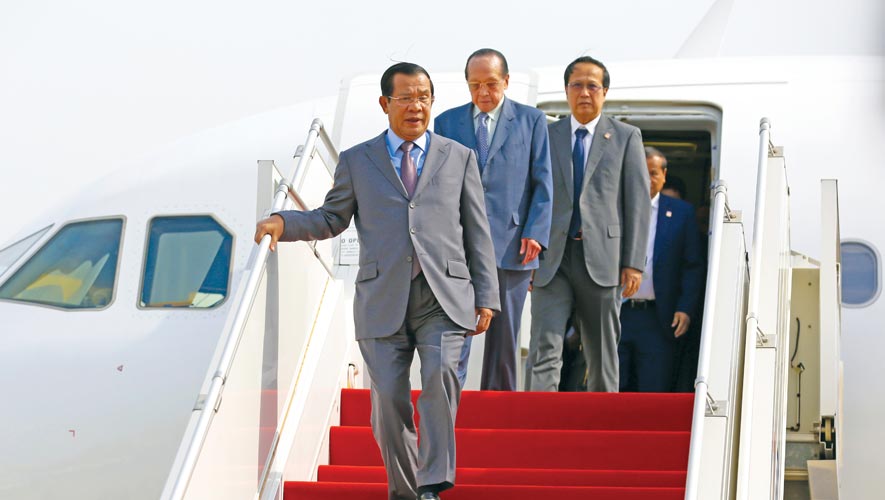Some, if not many, of Cambodia’s ministers have been holding their positions for a long time. Some since the first mandate which started way back in 1998.
For the latest Cambodian Business news, visit Khmer Times Business
Others were appointed subsequently in gentle reshuffles. While a few excelled in their positions such as Foreign Minister Prak Sokhonn, Public Works Minister Sun Chantol, Environment Minister Say Sam Al, Education Minister Dr Hang Choun Naron, and Director-General of Tax Kong Vibol, many others are in slumber, clueless over what they have to do. Or they might have a clue but rather not initiate it until and unless the big boss, Prime Minister Hun Sen, says so.
The Prime Minister has embarked on reforms in almost all sectors to make Cambodia more competitive and attractive to investors and buyers alike. This is to soften the blow of the possible revocation of the EBA but the bigger threat would be the removal of preferential trade agreements with the US.
As far as the Ministry of Commerce is concerned, it is not doing much to promote bilateral trade agreements. Procedures for any form of transaction at the ministry has become dogmatic instead of pragmatic and its poor handling of issues such as the rice safeguards, and lobbying against the revocation of the EBA are telling signs.
On this aspect, it would be worth noting that while Prime Minister Hun Sen criss-crosses the world to initiate dialogues and more importantly, trade agreements on a bilateral basis, the same cannot be said of most of the entourage who follow him.
There is little networking and most of the delegates rather follow the Prime Minister’s coat-tails than work on making deals on a counterpart basis.
Some senior officials are said to be so busy, they cannot grant appointments to meet within a year! How shocking is that? If this particular official is so busy, how is his agency carrying out its work, when does it execute its work and process applications, and how does it come to a conclusion on the results being announced, be it export statistics, investment details or taxation revenue?
The Prime Minister has placed various officials in key positions, practically leaving the cabinet unchanged from 2013. But then, the cardinal mistake of adding political appointees as secretaries of state with some ministries led to an overflow of secretaries and undersecretaries. This basically means that work cannot be divided and there is hardly any scope to operate. On top of that, inter-unit rivalry stymies any reform efforts undertaken at the department, ministy or national level.
If those at the national level, who are empowered to ensure reforms are carried out and implemented, struggle to some extent, given that the old guards have divided loyalties, what more at subnational level where they operate as Little Napoleons?
It is necessary to be clear about the difficulties of innovating at national and subnational levels due to widespread enthusiasm for innovations and change. As such, it would seem that reforms ought to come easily.
Additionally, there are some with vested interests who wouldn’t allow reformer leaders to do their jobs as they are sanctioned to do. The government may have little alternative to prevent ill will and infighting but to just let things continue the way they are going to prevent another front from erupting as the government strives to reform and reinvent itself while facing off trade sanctions and recalcitrant politicians.
These factors often reveal as to why supposedly well-crafted policies often fail to be adopted, and when they are, why they fail to achieve their desired objectives, as well as on why certain bad policies persist although acknowledged by policy leaders as such.
Other factors, according to World Bank’s report “Why do development policies fail?”, are that policymakers may have placed excessive emphasis on “best practices,” at the expense of other factors such as commitment, coordination, and cooperation. These are deemed plausible determinants of a successful policy.
“Besides, the preponderance of power asymmetry or the unequal distribution of power, in the political arena contributes to policy failure as it facilitates resource diversion through mechanisms such as clienteles away from contributing to policy success.”
Having said this, ministers and their designated spokespersons must reveal developments of public interests to the media and hiding matters would not augur well for the country.This includes the inability of nearly all the hydro power stations to produce even half the expected power capacity or how millions of dollars can be brought into the country by various means without being detected, despite sophisticated x-ray imaging devices.
These are just examples of systemic failures in governance, which if left untackled and unresolved, could shake the very foundation of the government in its quest for reforms and transformation.




